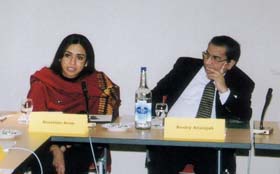A second draft of the Toolkit on ethics education developed by the Interfaith Council on Ethis Education for Children is being finalized and is available for use.
 The second draft of the Toolkit on ethics education through interfaith learning has been finalized and is available for use. This second version incorporates the lessons learned of the testing workshops carried out in Sweden, Colombia, Switzerland, India, Spain, Japan, Tanzania and Ecuador.
The second draft of the Toolkit on ethics education through interfaith learning has been finalized and is available for use. This second version incorporates the lessons learned of the testing workshops carried out in Sweden, Colombia, Switzerland, India, Spain, Japan, Tanzania and Ecuador. Experts on ethics, education and interfaith learning around the world have also contributed to the development of this second draft. Recommendations, inputs, clarifications and advice have been taken into consideration to make the Toolkit flexible enough to be used in different cultures, settings and with children and young people from different religions.
 The second draft of the toolkit is composed of four chapters. The first chapter is the approach to ethics education through interfaith learning. This chapter provides a comprehensive picture of what the toolkit is designed for, the rights-based approach to children and the importance of ethics education and interfaith learning in societies and communities. It also provides a reflection on spirituality and the need for nurturing and providing space for children’s innate spirituality.
The second draft of the toolkit is composed of four chapters. The first chapter is the approach to ethics education through interfaith learning. This chapter provides a comprehensive picture of what the toolkit is designed for, the rights-based approach to children and the importance of ethics education and interfaith learning in societies and communities. It also provides a reflection on spirituality and the need for nurturing and providing space for children’s innate spirituality.
The second chapter is divided in three parts. The first part is Learning Process and Guidelines, the second part, Learning Modules and the third part, Activities. Each part of the second chapter provides a better understanding of how the toolkit can be used and shows practically how values and spirituality can be nurtured in children.
The third chapter is a compilation of resources and references. The resources include poems, songs, stories, list of films, case studies and resources for worshiping and prayers. The references include a glossary, a list of abbreviations and a bibliography.
A program for training young adults on how to use the toolkit has been initiated as well. This process is envisioned as a way to promote ethics education among young adults who can be multipliers of the toolkit in their regions. A Trainers Manual is being developed to accompany the toolkit and to ensure a better usage and approach to ethics education through interfaith learning.
The process of developing the Toolkit still continues. In a genuine effort to develop an interfaith material we welcome recommendations and inputs and invite those who are interested to use it in organizations, schools and youth and children groups.
The Toolkit can be accessed online thorugh Campus on the ethics education webpage. Please contact the Interfaith Council Secretariat to get a password for the Campus, where comments, input and experiences of using the Toolkit can also be shared.
The Toolkit will be launched during the GNRC Third Forum organized by the Arigatou Foundation in Hiroshima, Japan from 24 to 28 May 2008. The development of the toolkit is an interfaith initiative promoted by the Interfaith Council on Ethics Education for Children. It aims at developing children’s innate spirituality and nurturing values that are needed and conducive to live together in plural societies.
The Toolkit will be launched during the GNRC Third Forum organized by the Arigatou Foundation in Hiroshima, Japan from 24 to 28 May 2008. The development of the toolkit is an interfaith initiative promoted by the Interfaith Council on Ethics Education for Children. It aims at developing children’s innate spirituality and nurturing values that are needed and conducive to live together in plural societies.